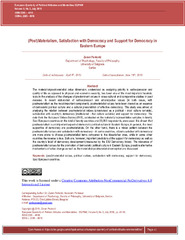Prikaz osnovnih podataka o dokumentu
(Post)Materialism, Satisfaction with Democracy and Support for Democracy in Eastern Europe
| dc.creator | Pavlović, Zoran | |
| dc.date.accessioned | 2022-02-11T13:36:33Z | |
| dc.date.available | 2022-02-11T13:36:33Z | |
| dc.date.issued | 2016 | |
| dc.identifier.issn | 2285 – 4916 | |
| dc.identifier.uri | http://reff.f.bg.ac.rs/handle/123456789/3458 | |
| dc.description.abstract | The materialist-postmaterialist value dimension, understood as assigning priority to self-expression and quality of life as opposed to physical and economic security, has been one of the most important heuristic tools in the analysis of the changes of predominant values in cross-cultural and comparative studies in past decades. In recent elaboration of self-expression and emancipative values (in both cases, with postmaterialism as the most important component), postmaterialist values have been viewed as an essence of democratic political culture and a cultural precondition of effective democracy. This study was aimed at analysing the relation between postmaterialist values (understood as a political - thick culture variable), satisfaction with country’s democracy (institutional - thin culture variable) and support for democracy. The data from the European Values Survey (EVS), conducted on the nationally representative samples in twenty East European countries on the total of twenty countries and 30,393 respondents, were used. It is shown that postmaterialism is an important aspect of democratic political culture in Eastern Europe; in general, the most supportive of democracy are postmaterialists. On the other hand, there is a mixed pattern between the postmaterialist values and satisfaction with democracy – in some countries, citizens satisfied with democracy are more prone to choose postmaterialist items compared to the dissatisfied ones, while in some other countries the reverse is true. Both are, however, important predictors of the support for democracy as well as the country’s level of democracy development (measured by the EIU Democracy index). The relevance of postmaterialist values for the promotion of democratic political culture in Eastern Europe, possible alternative mechanisms of value change as well as the materialist-postmaterialist conception are discussed. | sr |
| dc.language.iso | en | sr |
| dc.relation | info:eu-repo/grantAgreement/MESTD/Integrated and Interdisciplinary Research (IIR or III)/47010/RS// | sr |
| dc.rights | openAccess | sr |
| dc.rights.uri | https://creativecommons.org/licenses/by/4.0/ | |
| dc.source | European Quarterly of Political Attitudes and Mentalities | sr |
| dc.subject | (post)materialist values | sr |
| dc.subject | political culture | sr |
| dc.subject | satisfaction with democracy | sr |
| dc.subject | support for democracy | sr |
| dc.subject | East European countries | sr |
| dc.title | (Post)Materialism, Satisfaction with Democracy and Support for Democracy in Eastern Europe | sr |
| dc.type | article | sr |
| dc.rights.license | BY | sr |
| dc.citation.epage | 55 | |
| dc.citation.issue | 3 | |
| dc.citation.spage | 41 | |
| dc.citation.volume | 5 | |
| dc.identifier.fulltext | http://reff.f.bg.ac.rs/bitstream/id/7817/bitstream_7817.pdf | |
| dc.identifier.rcub | https://hdl.handle.net/21.15107/rcub_reff_3458 | |
| dc.type.version | publishedVersion | sr |

